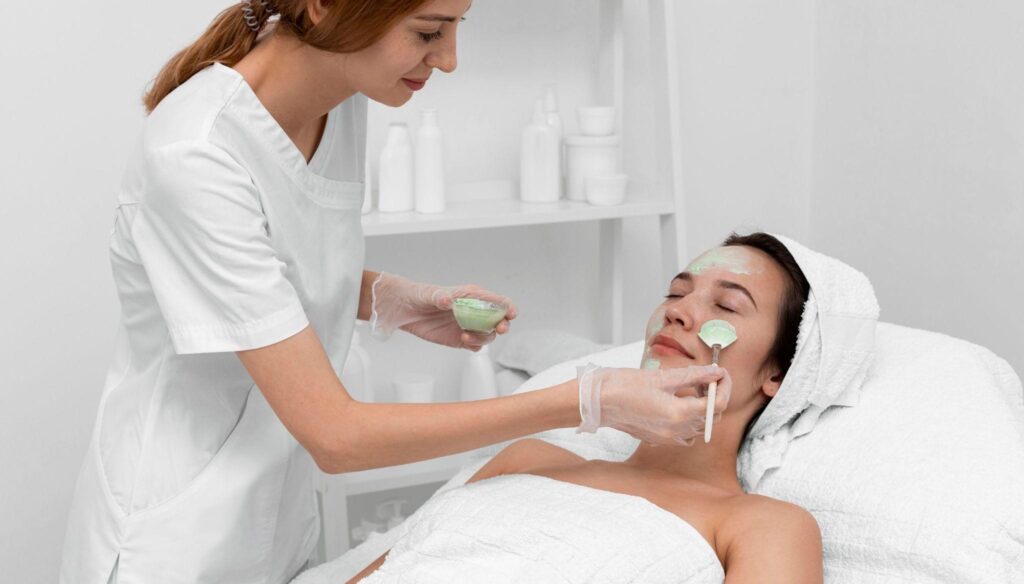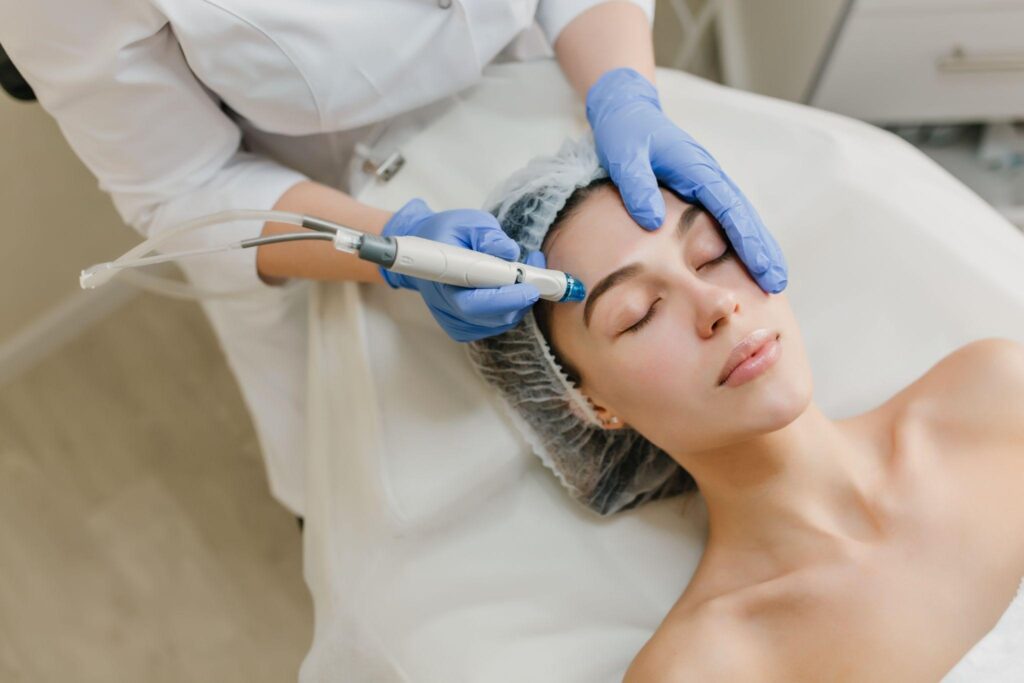Last updated on December 24th, 2024 at 02:48 pm
Skin whitening treatment, also known as skin lightening or bleaching treatment, refers to a range of cosmetic procedures and products designed to reduce the appearance of pigmentation, dark spots, and uneven skin tone. The skin whitening treatment aims to achieve a brighter, more uniform complexion by inhibiting the production of melanin, the pigment responsible for skin colour.
In a world where flawless, radiant skin is often considered the epitome of beauty, it’s no surprise that many individuals seek skin whitening treatments to enhance their complexion. While the desire for fairer skin is a personal choice, it’s essential to approach such treatments with caution, awareness, and an understanding of both their benefits and potential risks.
Skin Whitening Treatment
A few of the skin whitening treatment methods are:
- Topical Creams and Serums: One of the most common skin whitening treatments involves the use of topical products containing ingredients like hydroquinone, kojic acid, alpha hydroxy acids (AHAs), or retinoids. These components function by suppressing melanin synthesis while encouraging the renewal of skin cells.
- Chemical Peels: Dermatologists often recommend chemical peels, which involve the application of a chemical solution to the skin. This solution exfoliates the outer layer of skin, revealing newer, lighter skin beneath.
- Laser Therapy: Laser treatments target melanin in the skin, breaking it down and encouraging the growth of new, lighter skin cells. These treatments are more precise and can target specific areas with dark pigmentation.
- Microdermabrasion: This non-invasive procedure uses a machine to exfoliate the outer layer of skin gently. Over time, it can help reduce the appearance of dark spots and improve skin texture.
- Oral Supplements: Some individuals opt for oral supplements like glutathione, vitamin C, or collagen to promote skin whitening from within. However, the effectiveness of these supplements varies, and they should be used with caution.

Skin Whitening Treatment at Home
Skin whitening treatment at home has gained popularity as individuals seek convenient and cost-effective ways to achieve a brighter complexion. While they may offer some benefits, it’s important to approach them with caution and manage expectations. Common skin whitening treatments at home include:
- Lemon Juice: The natural acidity of lemon juice is believed to help lighten dark spots and even out skin tone. However, its high acidity can be harsh on sensitive skin and should be diluted with water.
- Yoghurt and Honey Masks: Its moisturizing and exfoliating properties make the mixture of yogurt and honey well-known
- Turmeric Masks: For centuries, people have used turmeric in skincare because it has the potential to reduce pigmentation. Mixing it with other ingredients like yoghurt or milk can create a brightening mask.
- Aloe Vera Gel: People believe that aloe vera lightens dark spots and promotes even skin tone because of its soothing properties.
- Papaya: Papaya enzymes can exfoliate dead skin cells and may help improve skin tone when applied as a mask.
> Consult a doctor and Order Medicine Online
Best Clinic for Skin Whitening Treatment in India
In India, several renowned clinics offer top-notch skin whitening treatments, making it crucial to choose the best one for your specific needs. Among the highly regarded options are Kaya Skin Clinic, Oliva Skin & Hair Clinic, and Dr. Sheth’s Aesthetic Solutions.
These clinics boast experienced dermatologists, state-of-the-art technology, and a wide range of treatment options, including laser therapies, chemical peels, and customized skincare regimens. However, the “best” clinic ultimately depends on individual factors like location, budget, and the nature of the skin concern.
It’s advisable to schedule a consultation to discuss your goals and receive personalized recommendations for the most suitable clinic and treatment plan.

What is the cost of Skin Whitening Treatment in India?
The cost of skin whitening treatment in India can vary significantly depending on several factors, including the type of treatment, the clinic or facility chosen, the location, and the extent of the procedure. Generally, topical creams and home remedies can be relatively affordable, ranging from a few hundred to a few thousand rupees.
In contrast, professional treatments like chemical peels or laser therapy can cost anywhere from 2,000 to 15,000 rupees per session. It’s essential to consult with a dermatologist to determine the most suitable treatment for your specific needs and budget and get an accurate cost estimate.
Conclusion:
Skin whitening treatment is a personal choice, and its success depends on various factors, including your skin type, goals, and the method chosen. Prioritizing safety and seeking professional guidance is paramount. Ultimately, the pursuit of radiant skin should be accompanied by self-acceptance and an understanding that true beauty comes in all shades. Remember, a healthy and confident you is the most beautiful version of yourself.
Read: What are Generic Medicines?
Are Generic Drugs As Safe As Brand Name Drugs?
Yes, generic drugs are typically as safe and effective as brand-name drugs. The CDSCO rigorously reviews and approves generic medications to ensure they meet the same quality, safety, and efficacy standards as their brand-name counterparts.
Generic drugs contain the same active ingredients and must demonstrate bioequivalence, meaning they work in the body the same way and provide the same therapeutic benefits. Choosing generics can often lead to substantial cost savings without compromising on safety or quality.
FAQs on Skin Whitening Treatment
Q1. What is skin whitening treatment?
Skin whitening treatments encompass a range of procedures and products designed to lighten and even out skin tone. They aim to reduce hyperpigmentation, dark spots, and the appearance of uneven skin, often by inhibiting melanin production or promoting skin cell turnover. These treatments can involve topical products, chemical peels, laser therapy, or natural remedies, all to achieve a brighter complexion.
Q2. What are the skin whitening laser treatment side effects?
Skin whitening laser treatment side effects can include temporary redness, swelling, and mild discomfort at the treatment site. In some cases, there may be a risk of hyperpigmentation (darkening of the skin) or hypopigmentation (lightening of the skin) if not done by a qualified professional. Sun sensitivity can also occur, making it crucial to use sunscreen after the procedure.
Q3. How long does it take to see results from skin whitening treatments?
Results vary depending on the method used. Some improvements may be seen in weeks, but full results often take a few months.
Q4. Are home-based skin whitening remedies as effective as professional treatments?
Home remedies can offer subtle improvements, while professional treatments tend to be more effective for significant and lasting results.
Related Links:

